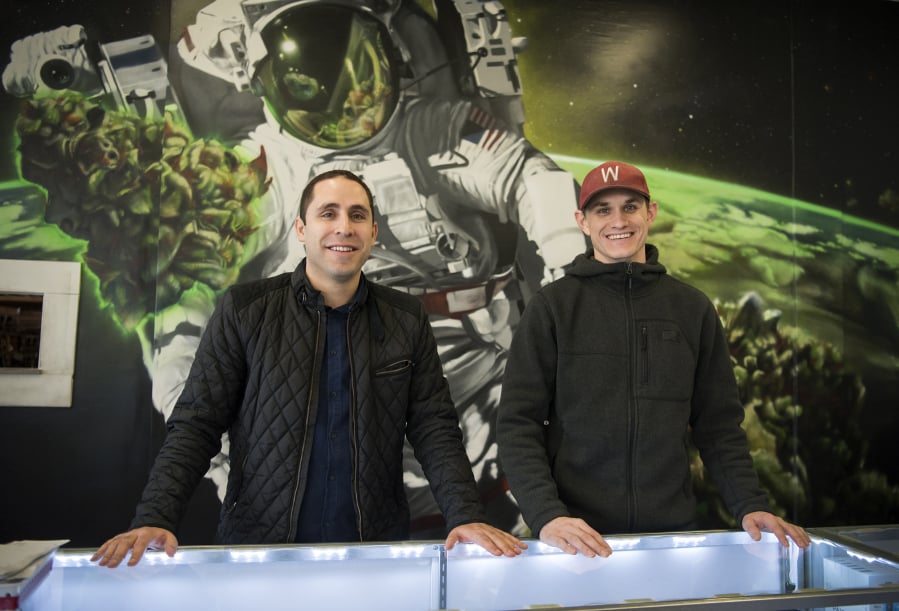Downtown Vancouver’s Main Street Marijuana has consistently held an unbeatable lead as the state’s highest-selling recreational cannabis store, and it’s quickly approaching a major milestone: passing $100 million in total lifetime sales.
The store’s owners expect to cross the threshold on Jan. 15 or 16.
“We’re the first one in the state to do it,” says Adam Hamide, one of the store’s three co-owners. “That’s a lot of tax dollars we’re taking out of the hands of criminals.”
The store’s net sales stand at approximately $68 million — with more collected for state marijuana taxes and sales taxes.
The marijuana taxes are collected by the Washington State Liquor and Cannabis Board, and the funding is distributed to a variety of state agencies, as well as local governments to help fund enforcement efforts.
According to a board report, the state took in $319 million in marijuana revenue in 2017. It said $145.7 million of that total went to fund health care services, $96.6 million went to the state’s general fund, $35.1 million went to education and prevention efforts, $1 million went to research, $6 million went to cities and counties and $15.1 million went to other agencies.
State of the market
With its lifetime total of around $68 million in sales after taxes, Main Street easily ranks first out of all of the state’s retail locations. The next runner-up is Uncle Ike’s in Seattle, with about $48 million in after-tax lifetime sales as of October, according to the industry tracking website 502data.com.
Main Street also consistently ranks first in the state in monthly sales, although it does have some competition in that department: Green2Go in Kennewick has come close to dethroning Main Street in monthly sales, a feat Hamide attributes to the store’s location near several areas with local bans on cannabis retailers — Green2Go’s website describes it as the “Tri-Cities only Recreation Cannabis Retailer.”
Despite remaining at the top of the pack, Main Street’s sales have been relatively flat for the past two years, hovering slightly above $6 million per quarter (pre-tax). But in the current market, Hamide says that’s an achievement.
Wholesale cannabis costs have plummeted in Washington due to oversaturation on the producer side of the market, and many marijuana retailers have been feeling the pinch of the falling prices, including Main Street.
“Back when we first opened, we were charging $40 per gram,” Hamide says. “Now we have three and a half grams for $15.”
Main Street has been able to make up the difference by consistently growing its customer base, Hamide says; average customer tickets have declined by about 10 percent, but foot traffic and transactions have gone up by about the same margin.
“We’re actually serving more customers than we ever have,” he says. “We’re happy where we’re at.”
The store employs 48 people, with an average of about 16 employees on site at a time. Foot traffic ranges from 1,700 to 2,000 customers per day, depending on the day of the week.
“On a busy day, like a Friday at peak hours, we’ll have as many as 19 (staff) on the floor and six in the back,” says co-owner Jason Keller. “Friday is definitely the busiest.”
Despite the legalization of recreational cannabis in Oregon, Hamide and Keller estimate that Oregon customers still make up about a quarter of Main Street’s overall foot traffic. The owners say the store’s large and popular product selection has allowed it to remain competitive in the Portland market.
Main Street’s large lineup stems in part from a difference between Washington and Oregon marijuana laws, Hamide says: Oregon law allows for vertically integrated cannabis businesses that operate as both producers and retail sellers, but Washington is more restrictive and keeps the two separate.
With both states facing overcrowded production markets, the vertically integrated Oregon stores are scrambling to sell their own products first, Hamide says, which limits their selection. Since Main Street relies entirely on separate suppliers, it doesn’t have to prioritize and can take advantage of the cheap wholesale prices to offer a much wider selection.
Growing the business
Hamide and Keller say the store’s success began with a case of lucky timing, but the two of them — along with the third co-owner, Hamide’s brother Ramsey — were able to maintain their momentum by making continued investments and improvements, expanding the store’s selection and maintaining low prices.
“Focusing in on what we have has allowed us to do what we do exceptionally well,” Hamide says.
The lucky circumstance at the start was the store’s location: It opened in July 2014 as one of the few initial locations in Vancouver, at a time when recreational marijuana was not yet legalized across the river in Oregon.
The vast majority of the store’s traffic during the initial months came from Portland, Hamide says, and the store’s comparatively large market area gave it a major lead in sales over other Washington stores. Net sales averaged just over $200,000 for the first eight months, then began to spike, reaching a high point of more than $2 million per month in the summer of 2015, according to 502data.
The surge generated enough revenue to allow the owners to lower their prices, which in turn attracted more customers, and so on.
“It kind of fed on itself,” Hamide says. “We haven’t looked back. We’ve had that momentum ever since, and we’ve kept it.”
The store’s best-selling months to date were July, August and September of 2015 — the final three months before recreational sales became legal in Oregon. Keller says that at the time, he and Hamide were worried about losing Oregon customers to the hundreds of new competitors that suddenly opened up just a few miles away.
Sales did drop substantially in October and November 2015, but recovered in subsequent months, eventually stabilizing at a rate of $6 million per quarter, which has remained consistent since the second half of 2016, according to 502data and the store’s own records.
Main Street’s customer base eventually transitioned to be more local. The owners don’t keep records of customers’ home states, but Hamide says that based on ID checks at the front door, roughly three-quarters of Main Street’s customers now hail from Washington.
In addition to lowering their prices, the owners have also put their proceeds toward expanding the business; Main Street now operates a second Vancouver location and a third in Longview — which has become the top-selling retailer in Cowlitz County, Hamide notes.
The original location has also gradually expanded from a starting size of about 1,000 square feet. At one point in 2017, the owners felt that the business had outgrown its space and they strongly considered moving, but ultimately were able to expand into adjacent suites in the same building, tearing out cosmetic walls to create the current 5,000-square-foot space.
Future plans
The Hamide brothers previously worked as online ticket brokers, and Keller worked at a security company, so opening up a physical retail store was new territory for them — let alone operating what would turn out to be the biggest marijuana retail location in the state.
“I have an MBA, but it was still a learning curve,” Hamide says. “Having employees and a brick-and-mortar store — none of us had that experience.”
Hamide says the co-owners initially opened the store because they saw it as a business opportunity, but he says he’s become proud of the store’s role in what he describes as bringing the marijuana industry “out of the shadows,” and generating new revenue for the state.
As the store has continued to grow, Hamide says the owners have tried to reach out to the surrounding area and find ways to better integrate Main Street into the community, such as by joining the Uptown Village Association and helping to organize street cleanup events.
“A lot of people view marijuana stores as liabilities, and we want to be viewed as an asset,” he says. “I think we’ve done that.”
Looking toward upcoming years, Hamid says he expects the supplier oversaturation problem to begin correcting itself as suppliers merge or scale back their operations, so he says he’s not concerned about further price cuts impacting Main Street.
“I think they’re as low as they’re going to be able to go,” he says.




